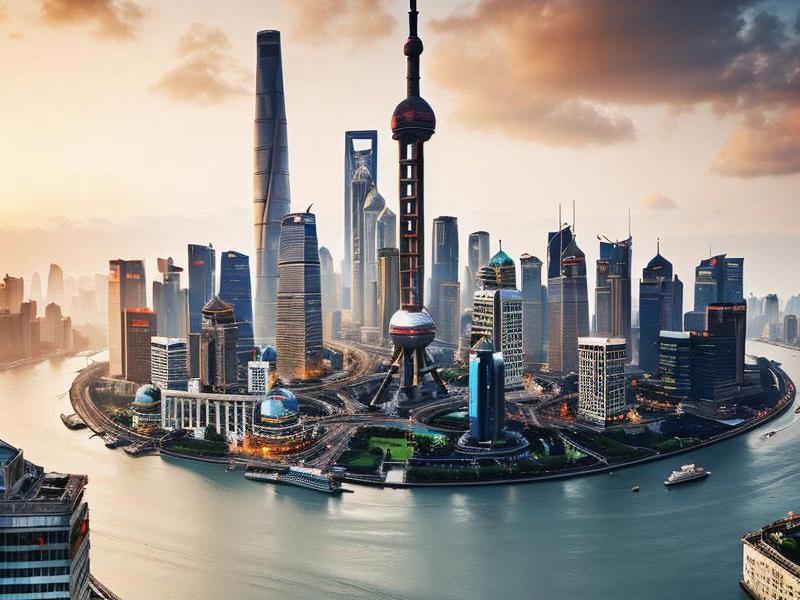This article delves into the dynamic facets of Shanghai, exploring its transformation into a global metropolis that seamlessly blends tradition with modernity. From its bustling financial district to its rich cultural heritage, Shanghai stands as a beacon of China's economic prowess and cultural vibrancy.

Shanghai, often referred to as the "Pearl of the Orient," is a city that has witnessed centuries of change, yet it continues to evolve at an unprecedented pace. Today, it stands as a testament to China's rapid urbanization and economic rise, attracting millions of visitors and immigrants from around the world.
The city's skyline is a visual representation of its economic might. The iconic Oriental Pearl Tower, the Jin Mao Tower, and the Shanghai Tower are not just architectural marvels but also symbols of Shanghai's status as a global financial hub. These skyscrapers house some of the world's leading banks, multinational corporations, and financial institutions, making Shanghai a key player in the global economy.
The Bund, a historic waterfront area, offers a glimpse into the city's colonial past. Once lined with British and French concessions, the Bund is now a popular spot for tourists and locals alike, who come to admire the stunning views of the Pudong skyline across the Huangpu River. The contrast between the historic buildings and the modern skyscrapers is a powerful reminder of Shanghai's transformation.
Cultural diversity is another hallmark of Shanghai. The city is home to a mix of different ethnic groups and cultures, which is reflected in its cuisine, festivals, and arts. From the bustling night markets of Nanjing Road to the serene gardens of Yu Garden, Shanghai offers a rich tapestry of experiences that cater to all tastes.
上海龙凤419体验 The city's commitment to sustainability and green development is also noteworthy. Initiatives such as the construction of the world's first maglev train line, the expansion of its metro network, and the development of green spaces like Century Park and Hongqiao Central Park demonstrate Shanghai's dedication to creating a livable and sustainable urban environment.
Shanghai's cultural scene is as vibrant as its economy. The city is home to numerous museums, art galleries, theaters, and music venues that showcase both traditional Chinese art and contemporary international works. Events such as the Shanghai International Film Festival and the Shanghai Biennale attract artists and audiences from around the world, further cementing Shanghai's status as a cultural capital.
Education is another area where Shanghai excels. The city is home to some of China's top universities, including Fudan University and Tongji University, which attract students from across the country and abroad. These institutions are not only centers of academic excellence but also hubs for research and innovation, contributing to Shanghai's reputation as a global knowledge hub.
Shanghai's culinary scene is a reflection of its diverse population. From traditional Shanghainese dishes like Xiaolongbao (soup dumplings) and Shengjianbao (pan-fried buns) to international cuisines, the city offers a culinary experience that is as varied as its people. The bustling food markets and trendy restaurants ensure that there is something for everyone, making dining in Shanghai an unforgettable experience.
上海娱乐联盟
The city's infrastructure is a testament to its forward-thinking approach. The Shanghai Metro, one of the most extensive and efficient metro systems in the world, provides convenient transportation for millions of residents and visitors daily. The city's airport, Shanghai Pudong International Airport, is a major gateway for international flights, connecting Shanghai to cities around the globe.
Shanghai's role in global affairs is also significant. As a member of the World Expo Organizing Committee, the city hosted the highly successful Expo 2010, which attracted millions of visitors and showcased China's commitment to sustainable development. The city's active participation in international forums and organizations further highlights its global influence.
The future of Shanghai is bright, with ongoing projects aimed at enhancing the city's livability and competitiveness. The construction of the Hongqiao Comprehensive Transportation Hub, which integrates high-speed rail, metro, and airport services, is set to further enhance Shanghai's connectivity. The development of the Lujiazui Financial District and the Pudong New Area continues to attract investment and talent, solidifying Shanghai's position as a global financial center.
上海龙凤419 Shanghai's commitment to innovation and technology is also evident in its smart city initiatives. The city is leveraging advanced technologies such as artificial intelligence, big data, and the Internet of Things to improve urban management, public services, and quality of life. These efforts are part of Shanghai's vision to become a globally leading smart city.
The city's cultural heritage is preserved and celebrated through various initiatives. The restoration of historic buildings, the promotion of traditional arts and crafts, and the organization of cultural festivals ensure that Shanghai's rich history is passed down to future generations. The city's museums and galleries play a crucial role in this effort, providing platforms for the展示展示 (showcasing) (“展示”翻译为“showcasing”)展示 (showcasing) (“展示”翻译为“showcasing”)展示 (showcasing) (“展示”翻译为“showcasing”)(showcasing) traditional and contemporary art.
Shanghai's resilience and adaptability have been key to its success. From overcoming the challenges of rapid urbanization to navigating the complexities of globalization, the city has consistently demonstrated its ability to adapt and thrive. This resilience is a source of inspiration for other cities around the world.
In conclusion, Shanghai is a city that embodies the best of China's aspirations and achievements. Its blend of tradition and modernity, economic prowess and cultural vibrancy, and commitment to sustainability and innovation make it a unique and dynamic destination. As Shanghai continues to grow and evolve, it remains a symbol of China's rise on the global stage and a source of pride for its residents.